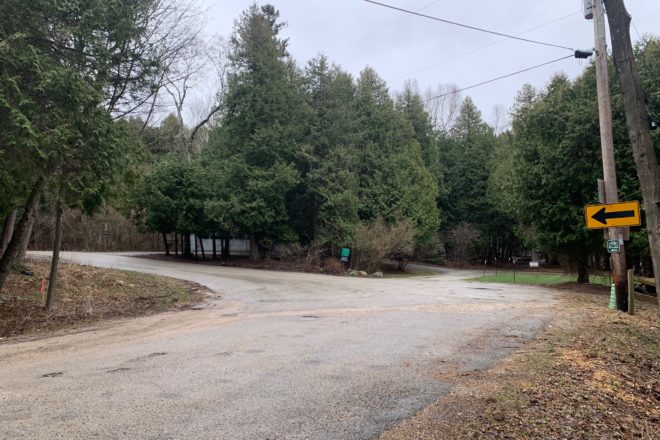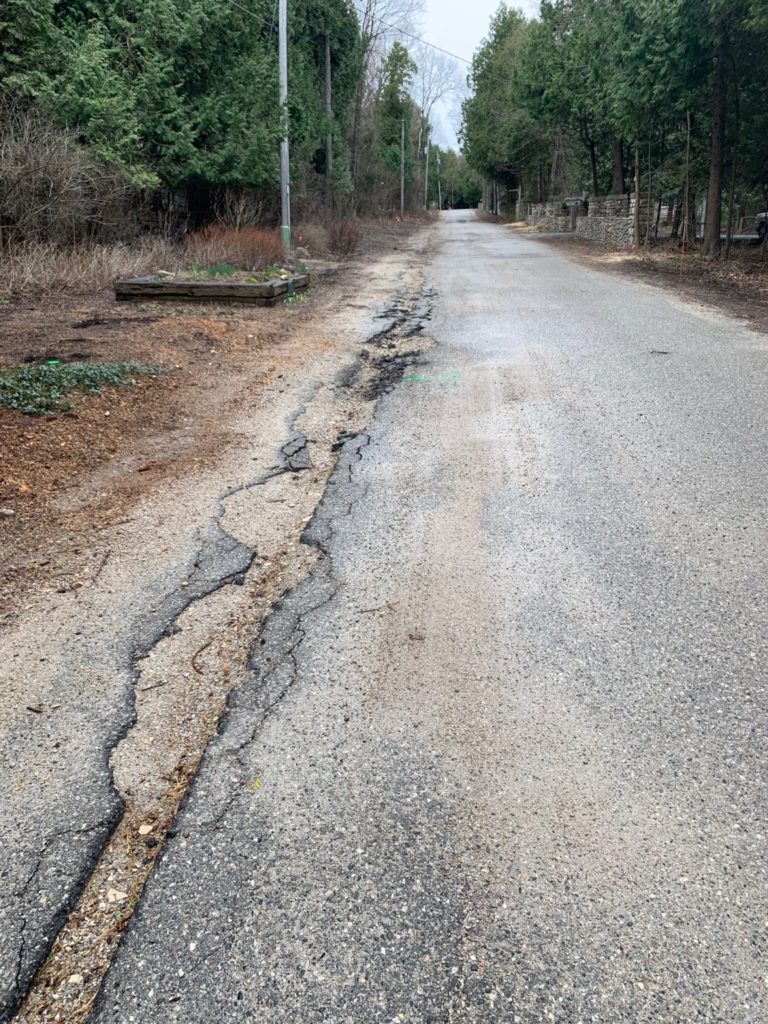Gibraltar Creates New Utility to Pay for Roads
- Share
- Tweet
- Pin
- Share

The Gibraltar Town Board created a new utility last week that treats the town’s 58 miles of road as a utility and then charges town residents and businesses for their use.
The town established the “transportation utility” during a special June 23 board meeting and adopted a fee schedule that will raise $400,000 annually. The money collected can be used only for road repair and reconstruction, vehicles and operations.
“It’s important for people to understand that it locks the money in for roads,” said Travis Thyssen, Gibraltar town administrator.
How It Works
The town contracted with consulting firm Ruekert & Mielke to create the utility, formula and fees. The fees charged are made up of a base fee and a usage fee. The base fee of $58.44 annually will be charged to everyone, whether a residence or a business. The usage fees will differ, however, according to whether the parcel is considered residential or business.
All residential parcels will be charged a usage fee of $76.08 annually. Added to the base fee, that’s $134.52 a year. The residential usage estimates that all residences in Gibraltar have 9.4 average daily trips in and out of the property, whether by the residents or other service traffic, such as mail, garbage and package or fuel delivery.
The formula for nonresidences or businesses is based on the type of business and the square footage of the building.
“Those that generate more traffic will pay more,” Thyssen said. “I think the tradeoff is pretty fair in that aspect.”
First, the businesses are divided into one of five groups based on the low, moderate, high or very high traffic usage they generate. The consultants used traffic studies to develop this metric and created a formula that specifically fits Gibraltar, Thyssen said.
Examples of each usage would be a school (low), a sit-down restaurant (moderate), a grocery store (high) and a gas station (very high).
Square footage of the business is also factored into the equation to account for differences among same-type businesses. Those two variables, plus the base fee, create the total annual fee a business would pay.
Samples given by the consultants to demonstrate the differences in fees among the traffic categories show that a 2,000-square-foot gas station – the highest traffic usage – would pay $3,353.88 annually. A 5,000-square-foot sit-down restaurant – a moderate traffic category – would be charged $2,795.28 annually. A 3,000-square-foot church – a low traffic-usage category – would be charged $142.56 annually.
Thyssen said he and the town’s staff went through every business to place them into one of the five categories. It wasn’t always just the type of business that determined the category, but the staff’s knowledge of how that business generates traffic.
“Group 4 has supermarkets, and our downtown has a mom-and-pop [supermarket] that doesn’t really fit into that model because they have more foot traffic, so we moved them into Group 2,” which has a lower traffic usage than Group 4.
The ordinance allows anyone who disputes the assigned grouping or questions the fee to request a review and reconsideration.
Beyond the residential and five business categories, there are specialty usages that include places such as parks, cemeteries and airports. That would include Peninsula State Park, which will also pay the fee. Its usage rate would be based on the park’s own visitation numbers. Thyssen said he was meeting with park officials about it this week.
Seasonal residences don’t get a break on the fee, but seasonal businesses that are closed for six months would pay only half the annual fee.
“They are not generating any traffic for half a year,” Thyssen said.

How Roads Are Funded Now
It’s costing municipalities everywhere far more to maintain roads with double-digit increases in nonresidential construction materials. Gibraltar learned this lesson recently when a Cottage Row project, estimated at $380,000, came in at $743,000.
“So one mile of road costs twice as much,” Thyssen said.
The town budgets about $350,000 annually to pay for roads. It also borrows money for improvements by selling bonds, levying more to property taxpayers to fund the debt.
“If we don’t do something like this [transportation utility], we are forced to come to electors to raise taxes,” said Town Board chair Steve Sohns during the June 23 meeting.
If a steady amount of revenue comes in annually, the town is hoping it won’t have to borrow for road maintenance, allowing it to reduce the debt levy that’s paid by taxpayers, which in turn means decreased taxes for property owners.
Currently, Gibraltar has about $12 million in town debt that taxpayers are paying off.
The board also considered more typical ways that municipalities raise funds for improvements: the wheel tax, which charges a fee per registered vehicle; and special assessments, which assess property owners who benefit from the improvements.
The board decided that the transportation utility was more equitable than either of those because everyone in the town is charged.
“We have 54 miles of road beyond downtown and only four downtown, so how do we get a fair assessment?” Thyssen asked.
“This brings in a larger group of people that actually benefit from our roads,” said Town Board supervisor Bill Johnson, about the nonprofits that would also be charged, including churches, the YMCA and the school.
Transportation Utilities Are Not Widespread and Sometimes Controversial
Transportation utility fees (TUFs) have been used in Western states, but only about six have adopted them in Wisconsin. Two of those fees are being challenged in court. At least another six communities are considering transportation utility fees, including the cities of Appleton and Oshkosh in northeastern Wisconsin.
That information comes from the nonpartisan, nonprofit Wisconsin Policy Forum (WPF), an organization that, along with the League of Wisconsin Municipalities, has been following the issue closely.
“There’s been an explosion of municipalities that are collecting or increasing fees,” said Mark Sommerhauser, a WPF policy researcher. “This is something that’s a little bit newer, having emerged more recently, and it’s not as widespread, but our research shows more and more municipalities are looking to adopt one.”
Sommerhauser said the higher number of communities looking at the funding mechanism may have been driven by the opposition.
“Perhaps they want to get it on the books before it’s restricted in law,” he said.
Earlier this year, Republican legislators drafted legislation that would have required local governments to lower the amount collected in property taxes by the amount collected through the fees. That legislation didn’t make it out of committee.
Meanwhile, the conservative Wisconsin Institute for Law and Liberty has argued that transportation utility fees are unlawful taxes and sued the Town of Buchanan for adopting such a fee in 2019. That case has yet to be decided, but it could be a bellwether for what’s to come.
“A lot is going to rest on the outcome of the court case,” Sommerhauser said.
Some Think It’s Fair, Some Don’t
The Town of Gibraltar first began considering a transportation utility about six months ago. Since then, Thyssen has held three public information meetings and another separate meeting for Fish Creek businesses. He said several hundred people were reached through those meetings, with a couple of them becoming standing-room-only.
During the special board meeting when the ordinance was adopted, roughly 20 people total were present, either via Zoom or in person.
Fewer than a handful of participants spoke, but one was Christie Weber, whose family owns the Bayside Tavern in Fish Creek.
Weber said she believed businesses were being unfairly charged. She was especially adamant about seasonal businesses not paying their full share and said the fee schedule “discriminates against businesses that struggle through the winters.
“We don’t feel our winter business is anything but a service to the community,” Weber said. “So charging us such an excessive amount when money is tight and expenses are going up, we beg you to delay in adding yet another fee which reduces our survivability and encourages people to close down in the winter – which doesn’t help the community at all.”
Another speaker, Carole VandeWalle, asked the board to wait and form a committee to study the issue “so businesses aren’t taking the full brunt.”
Thyssen said in response that businesses would pay 46% of total funds raised, and residents would pay 54%.
Resident Angela Sherman asked specific questions, concluding that “this is one of the only fair ways to do it besides raising taxes based on our assessed values,” she said. “This levels it a bit more. I appreciate that.”
Town Board chair Sohns, also during the June 23 meeting, said he had concerns about the fee, especially when people were having a hard time just buying groceries.
“I feel a little better because people I’ve listened to are OK with it,” he said.
The board unanimously approved both the ordinance that established the utility and the fee schedule that will raise the $400,000 annually.
Official notifications will be sent out to all residents and businesses in the near future. The annual fee would be payable in two installments during a full year. This year, only the second half of the biannual fee would be charged.





